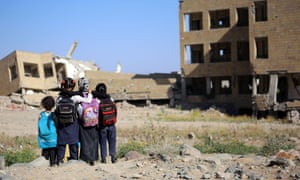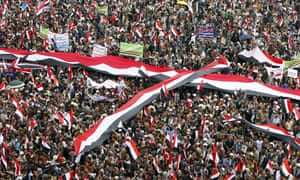Ahmed al-Asiri tells London seminar that human rights groups are being duped by Houthi rebels
A Saudi general has directly confronted critics of his country’s military campaign in Yemen during a lively seminar in London that saw him pelted with an egg by protesters as he arrived.
Speaking at a seminar organised by the European Council on Foreign Relations, Maj Gen Ahmed al-Asiri accused Saudi Arabia’s critics of making allegations without any independent evidence and of being duped by Houthi extremists.
The UK, which, along with the US, supports the Saudis against the Houthis, has been urged to reconsider its arms exports to Saudi Arabia in light of the devastating air campaign over Yemen.
Saudi Arabia is usually reluctant to respond to criticism, let alone hold a dialogue with its human rights critics, but its now two-year involvement in Yemen has forced the army to address its critics in the west.
Rights groups at the seminar challenged Asiri to say whether victims of Saudi-led coalition attacks had been compensated and military officers punished for bombing raids that resulted in the deaths of innocent civilians.

Human Rights Watch this week said Saudi Arabia may have committed a war crime on 16 March when a helicopter fired on a boat, killing at least 32 of the 145 Somali migrants and refugees on board and one Yemeni civilian. The attack occurred off the Yemeni port city of Hudaydah.
Asiri said Saudi helicopters did not hold the ammunition found at the site and told campaigners from Amnesty International and Human Rights Watch: “Stop communicating what the Houthi people put in the social media. To be constructive, give us evidence and we will engage with you.”
He said campaign groups were being bluffed by people on the ground and relaying Houthi social media propaganda.
The general gave no evidence as to whether military officers had been disciplined and said some offers of compensation were not advertised due to tribal rivalries. “There is no action on the ground that is not investigated,” he said.
As he entered the seminar, Asiri was subject to an attempted citizen’s arrest by the peace campaigner Sam Walton, who later said: “Asiri represents a regime that has killed thousands in Yemen and shown a total contempt for international law.”
During a protest outside the seminar, an egg was thrown at Asiri and he arrived at the event with stains on the back of his suit.
Inside, Asiri said some humanitarian NGOs were “spreading false information and deceiving people” but doing nothing to help people on the ground. He told the seminar he was delayed by “people who cannot understand the difference between protesting and attacking”.
Asiri accused the Conservative MP Andrew Mitchell of relying on one-sided Houthi propaganda to inform his views on the bombing campaign in Yemen and the causes of the country’s humanitarian crisis.
Mitchell, a former cabinet minister and an expert on Yemen, this week urged the UK government to tweak its policy by no longer siding with the Saudis but instead becoming neutral between the warring parties.
Asiri laid the blame for Yemen’s humanitarian crisis on the Houthis, accusing them of siphoning off food aid from Hudaydah or selling the food on the black market.

Riyadh has been accused of preventing replacement cranes getting to the Hudayah port that are needed to unload vessels carrying aid medicine and food.
Asiri said: “We keep hearing about starvation and the western part of Yemen has difficulties. Humanitarian food will not reach Hudaydah without any observers on the ground.”
He said the Houthis used the food at the port to “sustain their fight in the ground [and] they generate money by selling the food at 10 times the market rate and then they use it for political leverage”.
The general did not comment on rumours of a possible attack on the port but called for UN observers to be placed there to monitor the Houthis.
He denied the Saudis had played any role in blocking aid to the port, but called for a review of how UN’s $1.7bn (£1,3bn) humanitarian aid had been spent.
The Saudi government has said its motives have been misunderstood in the west, especially in Britain, where it claims the conflict has been portrayed as an assault by the wealthy Saudi Arabia on the poverty stricken Houthis rather than an intervention to prevent a minority community, backed by Iran, to destabilise a legitimate government.


